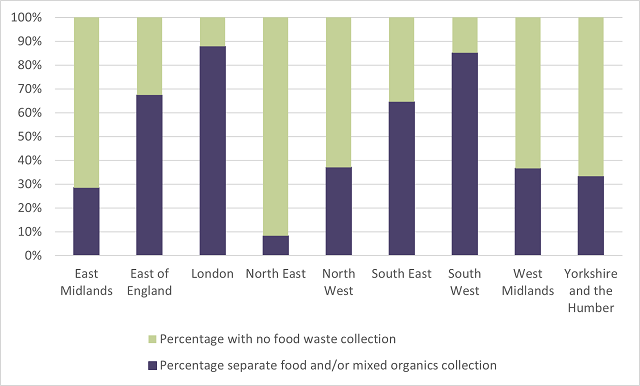There is a significant regional difference across England in relation to organic waste collection (and treatment) schemes. This is illustrated in the graph below. The south of England (London, South East, South West) has a notably higher percentage of food waste collections (separate or comingled) than the regional north does (Yorkshire and the Humber, North West, North East), with less than 10% of Councils in the North East having food waste collections in place. The East and West Midlands have high percentage of authorities not running a food waste collection with 71% and 53% respectively.

Figure 1: Regional percentages of food waste schemes source: WRAP LA Portal (based on 2021/22 data)
While some Councils serve a high proportion of their households with food waste collections, some authorities in areas like London have a separate food waste scheme that only serves a relatively small proportion of, for example, flats or estates. The areas with a higher percentage of separate food waste compared to a comingled organics scheme are the East of England, London, North East, South East, South West and West Midlands.
Challenges affecting food waste collections include local authorities struggling to cover upfront investment to operate a separate food waste collection. To support consistent collection and expand the number of food waste schemes, the governments Simpler Recycling collections requires additional collections to be implemented by March 2026 for households (a year earlier for most Businesses and other non household municipal waste sources). It will require food waste to be collected as a separate weekly stream (albeit there is an exemption for comingling with garden waste). The separately collected organics will require recycling (e.g. through anaerobic digestion, AD), which necessitates a procurement process and the associated operating costs, noting there will be some offset from avoided disposal gate fees.
So what does this tell us? Notwithstanding those Councils which have agreed (or will agree) a derogation from the requirement to separately collect food waste, there will be a substantial demand on food waste vehicles, caddies and also a substantial demand for procuring / developing anaerobic digestion or In-Vessel Composting capacity. The North and the Midlands regions broadly speaking, will have the greatest demand in both respects.
Or an alternative way of looking at this would be that due to likely delays in the supply chain that at a regional level, the North and Midlands may struggle to implement the required changes in time. This is not to say that other regions more advanced in implementation also won’t have issues as there may still be a lack of treatment capacity available in particular areas and individual Councils may also experience delays in procuring vehicles for example. Furthermore, some regional co-ordination would benefit in particular the North and Midlands authorities to prevent market distortions and disproportionate costs falling on these Councils due to supply / demand factors.
Planning for the changes as early as possible should yield benefits, and waiting for clarity on net new burdens before taking action could become a false economy, for the reasons outlined above.
It should be noted that some Councils have already decided to seek a derogation from the implementation timeline, Sheffield City Council for example are seeking an extension, potentially up to 2038, due to their contractual situation.
Frith Resource Management provide market intelligence and technical advice on reuse, collection, recycling, treatment and disposal for municipal waste services. For more information see www.frithrm.com or email paul@frithrm.com or call 01746 552423













